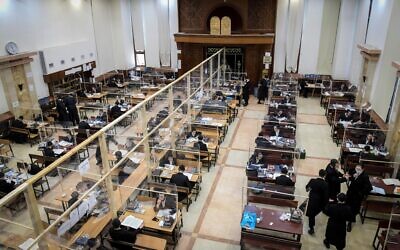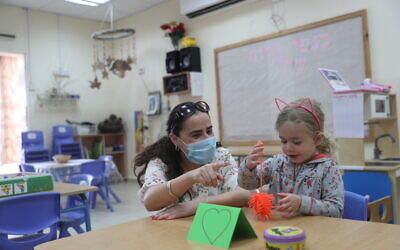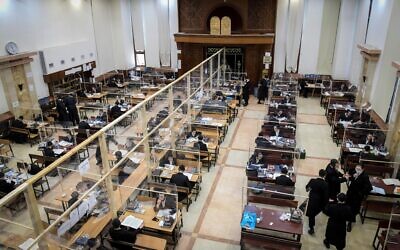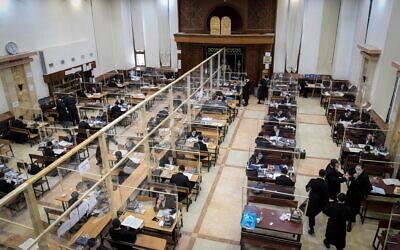With three days to go before the start of the school year on Tuesday, the Teachers Union has threatened to strike over the failure to agree upon a solution for high-risk staff members, and the national parents union has said it would tell parents not to send their children to school due to what it says is a lack of preparedness for teaching during the coronavirus pandemic.
A hearing was set to take place at the Tel Aviv District Court on Sunday to consider the order issued by the state last week prohibiting a strike action by teachers at the beginning of the academic year, with the union saying there still has not been a solution found for workers who are deemed to be at high risk for the virus, particularly 1,500 kindergarten staff.
The union is demanding full sick pay for those unable to work due to the pandemic, whereas the treasury is proposing furloughing such staff members or allowing them to retire.
The union has suggested that instead, they should be reassigned to remotely teach high-risk children who cannot attend school or kindergarten, or allow doctors to issue them with the certification required for them to use their sick days to stay home.
“Currently, we will not go to work on Tuesday. There is a labor dispute and the state wants to issue a restraining order,” Edna David, deputy secretary-general of the Teachers’ Union, told Channel 12 news. “We will ask the court to decide whether the lives of those teachers and kindergarten staffers are important. A solution must be found for those who have underlying illnesses.”
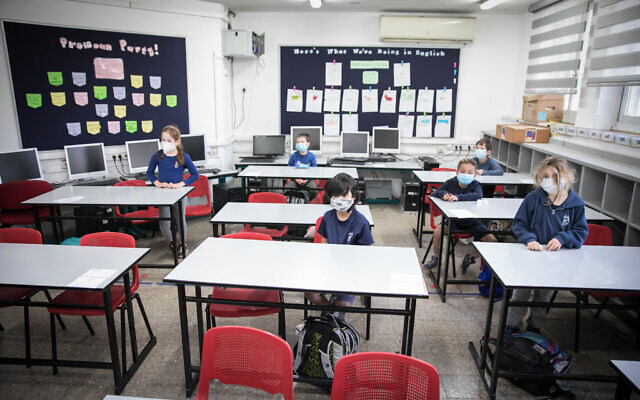
Israeli students wear protective face masks as they return to school for the first time since the outbreak of the coronavirus, on May 3, 2020, in Jerusalem. (Olivier Fitoussi/Flash90)
Meanwhile, the national parents committee expressed dissatisfaction with the capsule system, which could see some children in school for only two days a week.
Additionally on Sunday, ministers are expected to discuss coronavirus czar Ronni Gamzu’s “traffic light” plan, which last week they refused to approve for a third time.
If passed, educational institutions could be shuttered in areas deemed to be “red” with a high rate of infection.
The mayor of the ultra-Orthodox city Bnei Brak, which is expected to be classified as a “red” city, told the Walla news site that closing schools was not the solution to the problem.
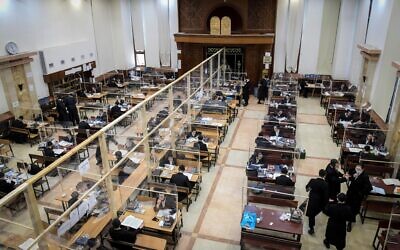
Ultra-Orthodox Jewish men study at the Gur Imrei Emes yeshiva in Bnei Brak, June 16, 2020 (Yossi Zeliger/Flash90)
“The virus is probably here for a long time; we cannot behave this way,” said Avraham Rubinstein. “On the contrary — we must adopt a lifestyle with precautionary measures in the shadow of the virus, including in the education system. This is the only way.”
The mayor of Kafr Qasem, though, said that he would welcome measures to slow the rate of infections in the Arab town.
“Today we have almost sixty people infected per day and it’s a pretty fast pace,” Badir Adel told Walla. “We started working on the traffic light program with Gamzu’s team about a week ago, and we’ll wait for the program to yield results. We recommend not opening the education system in red cities in general including in Kafr Qasem. I believe it will take us two weeks until things calm down and we can reduce the rate of infection, and then we will open the education system.”
The Education Ministry has faced criticism over concerns that the education system was unprepared for the new restrictions imposed by the pandemic. The swift reopening of school in May has been blamed for the resurgence of the virus, which had nearly disappeared while schools were shut and the country was under lockdown.
Classes will be held according to the Education Ministry’s “Safe Learning” plan, which was developed in response to the pandemic and will see full-sized classes for the first two grades, capsules for grades 3 and 4, and an emphasis on distance learning from grades 5 through 12.
The legislation to grant funding to schools to deal with the pandemic did not reach a planned Knesset vote last week, after the coalition apparently failed to gather enough lawmakers to support the bill ahead of a week-long summer recess.
The vote will now be delayed until after the school year begins. The Finance Committee previously approved the legislation, which amounts to NIS 1.75 billion ($515 million) for schools.
Israel has been operating without a 2020 budget, meaning ministries must use 2019 budget numbers, which do not cover the pandemic, even as schools and other institutions grapple with the expenses of coping with the coronavirus.
Furthermore, over 50,000 Israeli schoolchildren will start the academic year without the equipment they need, and one fifth of students don’t have a computer or the internet access required for remote learning, a report said last week. The Latet organization, which provides various welfare and food aid services to those in need, said 53,000 children were lacking the basic supplies needed to start the school year, with the situation exacerbated by the need for online learning.
 RSS Feed
RSS Feed















 August 30th, 2020
August 30th, 2020  Awake Goy
Awake Goy 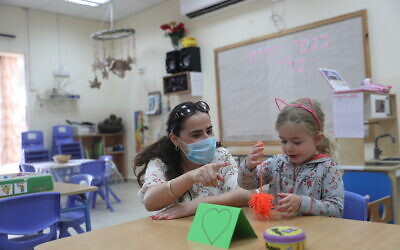
 Posted in
Posted in  Tags:
Tags: 